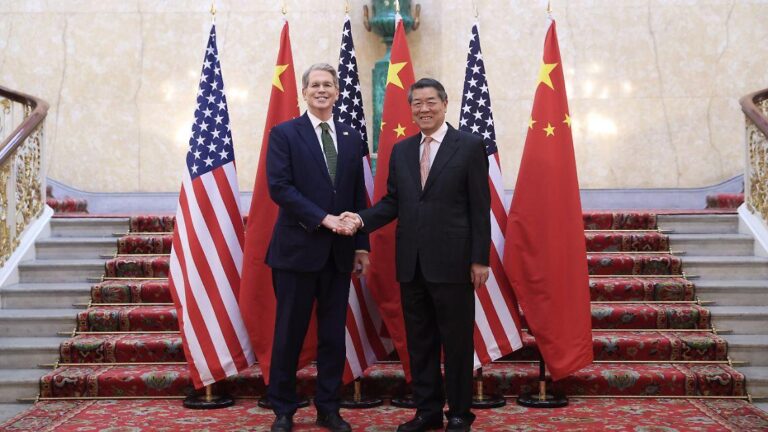In a strategic move amid ongoing trade tensions between the United States and China, Beijing has signed an exclusive agreement with Argentina to test Argentine soymeal exports, Reuters reports. This development signals China’s intent to diversify its import sources and mitigate potential disruptions stemming from the protracted US-China trade war. The deal underscores China’s broader efforts to secure alternative agricultural suppliers as it navigates shifting global trade dynamics.
China Strengthens Soymeal Supply Chain Amid US Trade Tensions
In a strategic move to counteract potential disruptions stemming from escalating US-China trade tensions, Chinese authorities have inked a preliminary soymeal supply agreement with Argentina. This test deal represents a calculated effort to diversify China’s protein ingredient sources, reducing its historical dependency on US agricultural exports. Analysts view this pact as a vital step toward securing a more resilient and flexible supply chain for the country’s vast animal feed industry.
Key facets of the China-Argentina soymeal agreement include:
- Initial trial shipment volumes aimed at gauging logistical efficiencies
- Collaborative frameworks for quality assurance and regulatory compliance
- Exploration of advanced storage and transportation infrastructure to preserve product integrity
| Aspect | Details |
|---|---|
| Volume (Trial) | 50,000 Metric Tons |
| Price Benchmark | Competitive with US gulf soymeal |
| Delivery Schedule | Q3 2024 |
| Primary Ports | Rosario, Buenos Aires |
Implications of the Argentina-China Soymeal Agreement for Global Agriculture Markets
The newly inked soymeal test agreement between Argentina and China signals a strategic pivot in global agricultural trade dynamics, particularly as Beijing looks to diversify its import sources amidst ongoing tensions with the United States. With the U.S.-China trade war continuing to unsettle commodity flows, China’s move to trial soymeal purchases from Argentina not only cushions against supply shocks but also challenges the long-held dominance of U.S. soy exports in Asian markets. This development is poised to reshape supply chains and pricing structures worldwide, potentially benefiting South American producers who can capitalize on increased demand from China.
Key takeaways from the agreement’s potential market impact include:
- Price volatility: Greater competition among suppliers may lead to fluctuating soymeal prices, affecting feed and livestock industries globally.
- Trade diversification: Countries traditionally dependent on the U.S. market may seek alternative partners, creating new alliances.
- Supply chain resilience: The pact encourages more robust, geographically diversified supply networks to mitigate future trade disruptions.
| Factor | Argentina | China | U.S. |
|---|---|---|---|
| Current Soymeal Export Share | 15% | – | 60% |
| Projected Demand Growth | +10% | +5% | -3% |
| Trade War Exposure | Low | High | High |
Strategic Recommendations for Stakeholders Navigating Trade Disruptions
In light of recent developments, companies and policymakers must adopt a proactive stance to mitigate risks associated with shifting trade dynamics. Diversification of supply chains emerges as a critical strategy; stakeholders should explore alternative sourcing options beyond traditional markets to avoid over-dependence on any single region. Simultaneously, fostering robust communication channels between producers, regulators, and consumers will enhance transparency and responsiveness in an unpredictable trade environment.
Moreover, investing in technological innovation and quality assurance stands to provide a competitive edge as global trade tensions persist. Key recommendations include:
- Implementing enhanced traceability systems to verify product authenticity and compliance
- Strengthening bilateral agreements with emerging markets for smoother trade flow
- Leveraging data analytics to anticipate and plan for tariff adjustments or embargoes
- Encouraging public-private partnerships to build resilience against supply chain disruptions
| Action | Benefit | Priority Level | |
|---|---|---|---|
| Supply chain diversification | Reduces dependency risks | High | |
| Adopt traceability tech | Ensures compliance & trust | Medium | |
| Form bilateral partnerships | Increases market access | High | |
| Use data analytics | Use data analytics | Anticipates trade changes | Medium |
| Encourage public-private partnerships | Builds supply chain resilience | High |
If you want any additional modifications or different styling, just let me know!
To Wrap It Up
As China moves to solidify alternative supply channels amid ongoing trade tensions with the United States, this newly inked soymeal testing agreement with Argentina signals a strategic pivot in Beijing’s agricultural import strategy. Market analysts will be closely watching how this development influences global soymeal trade flows and the broader dynamics of the US-China trade conflict. Further updates are expected as both nations implement the terms of this deal and navigate the complexities of international commerce in a rapidly shifting geopolitical landscape.




